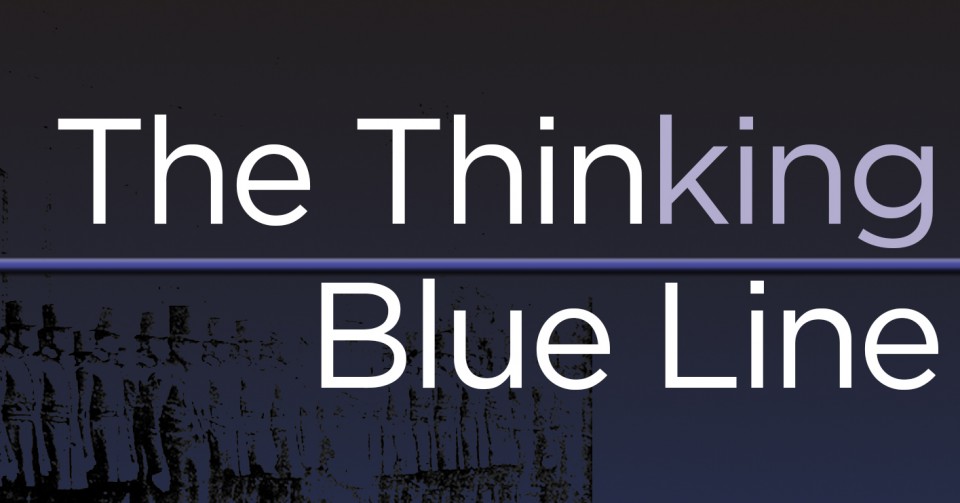
Gareth Stubbs is a PhD student at Canterbury Christ Church Police Research Centre and has an MSc in Leadership and Mgmt in Policing from Warwick Business School, and an MRes in PoIicing (also from Canterbury). He has also collected a Law degree and English Language Degree on his travels, and has now been a serving Police Officer for over 16 years at the time of writing. Gareth is passionate about using good research in Policing and believes that better partnerships between police and academia represents a good proportion of the future.
I’m writing this blog after being lucky enough to attend the British Society of Criminology (BSC) annual conference at Birmingham City University. Before the usual eye rolls about conference attendance, I shall hopefully address some of what they actually ‘do’ later, so please save your scepticism until after reading 🙂 I also need to clarify that I received a bursary (the Post-grad Bursary from the BSC itself) to attend the conference and apart from Conference food and drink, I paid for all my own and won’t be claiming any of it back – why is this important? Because for some reason, we shout ‘tax payers money‘ at officers who want to learn and develop. It’s a bit like members of the public shouting at officers who eat during their shift. Clearly it’s very positive that serving officers are trying to keep their blood sugar levels up whilst on duty, just as it’s positive that officers are trying to learn more about their job, so that they can make better decisions when actually doing it.
That aside, I’m hoping that this blog may create some debate – as they often do. Whilst the Academic Illuminati© seek to overthrow the police Resistance, I am reminded that in many, many cases, police officers have had no contact with what academia does, or how it does it, and subsequently what it may mean for practice. Policing is easy to criticise when you have no knowledge of doing it, as many police officers will be aware as they receive public complaints about how they do their jobs. It is therefore incredibly disappointing to see police officers decrying results of surveys/studies by attacking the survey questions or the method of investigation – all of which has been heavily considered by people who often have many years of experience compiling them. It’s totally fine to raise questions, of course, that’s part of what academia is all about. But as with many things, it’s not just what you do, it’s how you do it.
Bearing this in mind, let’s discuss some of what an academic conference ‘does‘ and ‘is‘.
Broadly speaking, groups of people involved in study within a particular area, come together to present ‘papers’ on what they are studying, or questions that they feel are important. This means that you can see presentations on many topics, that are often investigated in many different ways. There tends to be a main lecture theatre for what are called ‘Keynote’ speakers, and several break out rooms that then present in more niche areas. You get the program in advance, and are able to choose which break outs you attend, in addition to the main speakers that form what could be called the backbone of the conference. There are usually several speakers that speak in the area that you are interested in, so you get to tailor who you meet and learn from.
Warning: Long words ahead (sorry, not sorry :-D)
In the BSC, I got sample a really broad selection of what Criminology is/does/represents. It’s quite a strange discipline because it encompasses lots of different methods. What do I mean by this? To give an example, Psychology is dominated by statistical analysis of experimental outcomes. This means that there is a ‘way’ of conducting and learning about psychology that is broadly accepted as the norm. In criminology, this ‘way’ is disparate and some may say, fractured. There are functionalist approaches – these look at broad effects using statistical methods – think census data or similar, but equally there are symbolic interactional approaches (bear with me, please) that look at face-to-face communication and the meaning that we convey in inter-personal encounters. Similarly, there are action research projects ongoing within forces/prisons – these tend to involve practitioners and academics working together to design and conduct research, that would clash spectacularly with the experimental, randomised control trial led research championed by Prof. Larry Sherman at Cambridge. This last strata was largely absent at the BSC, but can be found going great guns at the Society of Evidence Based Policing (SEBP) conferences.
Above all of these, there is a strand of theoretical, philosophical research that looks at what we consider to be knowledge, and tracks/develops trends in thinking over time. This is the big stuff and I get lost in it. It’s nice to do the mental gymnastics around it if you are into that stuff, but from my perspective, the application to practice is remote. I appreciate this may be from a point of ignorance (mine of course), but for the bobby on the beat, or the investigator in the office, it is just too far removed to mean anything.
So what does this tell us about Criminology and how it can help us police? It actually tells us a lot. There are pockets of researchers and methods that we can take advantage of and use for every area of policing, we just have to be able to know how to use them, where to use them, and what they will give us at the end. Criminology presents us with a smorgasbord of options to choose from, we as a profession have to be careful not to limit them or shut them down.
So what does the products look like? What do the outcomes of using academia actually do?
This is a good question, and to properly understand it, we have to understand what science and the application of the scientific method actually is. Unfortunately it isn’t quite as simple as a single sentence, but I like to try and wrap it up as ‘a particular way of thinking about the world.’ This way encompasses lots of questions, tests, observations, reports and then usually re-testing to check that what you did the first time around actually works. People who don’t see this as valuable will denigrate it in the usual ways, by saying it takes too long, or that it’s biased, or that academia isn’t the ‘real world.’ Quite weird really, as all academia does is examine the ‘real world…’ using more rigorous thinking than would usually be the case?
Back to products. What does a conference actually produce? It’s quite weird for me as an officer to see researchers from different universities watch a ‘paper’ (presentation) and then say, ‘Your research is really interesting and I think we can work together‘ during the questions part, only to see them deep in conversation over coffee in the next ten minutes with contact details exchanged. You don’t see this in cop conferences really, they can get a bit ‘peacock-ey‘ where forces appear to be more in competition with each other than they do collaboration. The College has developed some Peer Review functions and started to gather a uniformed set of ‘evidence’ that seeks to combat the peacock stuff, but it’s refreshing to hear people at the conference speak about forging connections with people both inside and outside their area as a major motivator for attending. I get the impression that these groups of researchers working together to advance their understanding in their area is really rare in policing – I think forces tend to forge ahead with projects in isolation and only come together after everything has been delivered (and it’s always delivered – of course!).
Practical stuff? Well, I saw a whole bunch of presentations that would help me if I worked in Neighbourhood Policing (legitimacy research and community engagement), Response Policing (mainly body worn video and technology but also missing from homes), and Policing in general (diversity, Senior Women in Policing and others). I also attended one paper (really trying to use this word as it feels weird to me) where they discussed the legal frameworks around implementing decision making models based on algorithms in policing. These are landing in forces now, and I found the presentation fascinating. It was delivered by a Law Senior Lecturer (Dr. Jamie Grace), and discussed the real risks around bringing these models into the policing environment. I passed that straight back to senior officers in force who are discussing some of these models, and it may mean that we make far better decisions down the line. Ultimately, seeing that one presentation, may save tens of thousands of pounds of tax payer’s cash…
So, more generally, I think I was the only attending officer at the conference, although there were several that were retired or had left the service prior. I was welcomed by everyone (and this was a big conference). I felt a bit swamped by the theory stuff (and I do actually enjoy that stuff), and got lost in the odd question about particular scientific methods. I did take some tangible things away that will help with my job, and managed to spend the vast majority of it learning about research ongoing around the country in criminology that directly affects policing. It was a great experience, and I would recommend that people apply for the bursary next year if they can. To apply, you have to be a member of the BSC, and there’s an annual fee that is manageable if you are studying (yes, I pay for it myself).
Aside from the conference, the title of this blog professes to discuss how criminology and policing interacts. Although I haven’t addressed this directly, I think I have covered some of it, but will put it into more practical terms now: Applying science to policing changes the way that we think. This change is threatening. If I’ve spent my entire career gathering experience, and then someone with none of it comes along and tells me some of my fundamental beliefs are actually incorrect, how am I likely to react? We have seen it happen with ‘fake news,’ politics over the last few years, and more recently seen it analysed after the Brexit and Trump vote. The natural reaction is to double down into our established identity, and denigrate the ‘other’, no matter how much evidence is presented. This is happening now in policing, and it’s happening as the two identities of policing and academia become closer than just touching distance.
These conferences are a place of ‘between.’ What does this mean? It means that practitioners will never be truly comfortable in the academic environment, just as I suspect academics may not be comfortable at wholly practitioner based events. This merging will take many, many years, because you can’t just knock down a pillar of a profession overnight. In this case, the way that police idolise and fetishise experience as the only way of learning anything remains steadfast, and baulks at the encroachment of book learning or research. Mixed areas where experience ‘clashes’ with this different way of learning are places of friction, and anyone navigating this relationship has a challenge on their hands. Remaining ‘police’, whilst developing to think differently means treading a tightrope of identity, and falling off is a real possibility. These events are a way to practise, see both sides, and see those opportunities that allow both to be pulled together for the greater good. If you are one of these practitioners, be prepared to make sacrifices on both sides, as you lose your balance occasionally. At some point in the future, the tightrope will become a beam, and then finally a path, but the journey from here to there won’t be easy.
When we are seeking to place the academic ‘conference’ as thing into the realm of policing, we have to have a serious think about what it can ‘do.’ From this experience, making sure that people have an opportunity to network outside of their immediate police environment is very important – it drags their perceptions wider and can change decision making in their jobs on a daily basis. Gaining contacts in a specific field of research means that you can throw out questions that may be very difficult to answer in the police environment, to people who know the answer very quickly. The ability to do this can not be undervalued – it’s very important for operational policing. And finally, as a practitioner attempting to forge a path between the two – rather than skipping from one to the other – it’s important that academia acknowledges that the police aren’t just listening and conversing with research, they are doing it too. It’s an opportunity for both to learn from each other.
A final note for practitioners. If you are lucky enough to be asked to attend one of these events, or persistent enough to forge your own path into one, have a hard think about how the conference may create real difference in your work and design your program to get the best connections and learning that you can. Learning for learning’s sake is always a good thing, but it’s better when you are able to take real, tangible benefit in your day job from that learning.
Many thanks to the BSC for the opportunity to attend, and to all the awesome people who made me feel comfortable there.
Originally posted on thinkingblueline.com
Contact:
Gareth Stubbs
Email: Gareth.Stubbs@lancashire.pnn.police.uk
Image: courtesy of the author




You must be logged in to post a comment.